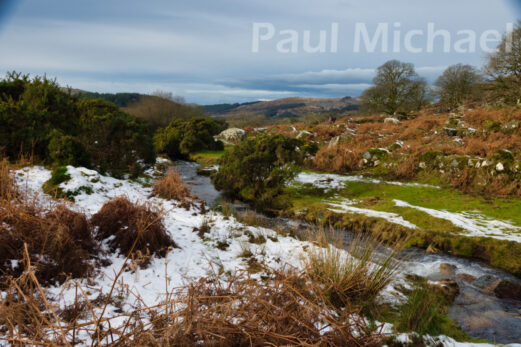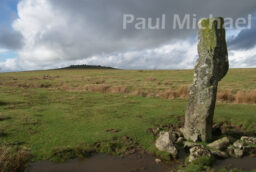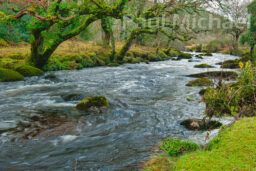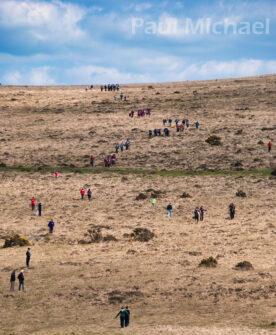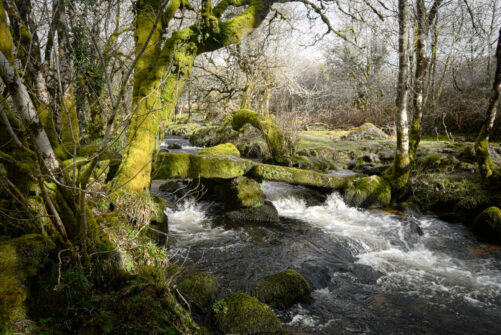Last Updated on 29th October 2025
I wrote this after the court decision on Friday 13th January 2023 ruled that ‘wild camping’ does not constitute ‘open-air recreation’. That court decision meant that wild camping without the landowner’s permission was considered unlawful on Dartmoor and those doing so without permission would be trespassing.
UPDATE: I have added a section at the foot of this article to cover the latest news and outcome from the Supreme Court.
Mr & Mrs Darwall, land owners of an extensive area of Dartmoor commons since 2013, brought the case to court to seek clarification of the meaning of section 10(1) of the Dartmoor Commons Act 1985 (“the 1985 Act”). It is not known why they sought to do this. Some speculate that their interests are in hunting and that the interests of Mr Darwall, a wealthy hedge fund manager, are not in keeping with that of the Dartmoor National Park and those who visit it. No dispute has been raised by anyone else during the past 35 years of the 1985 Act being in force.
Reference to ‘walking’ in this article also means hiking and trekking.
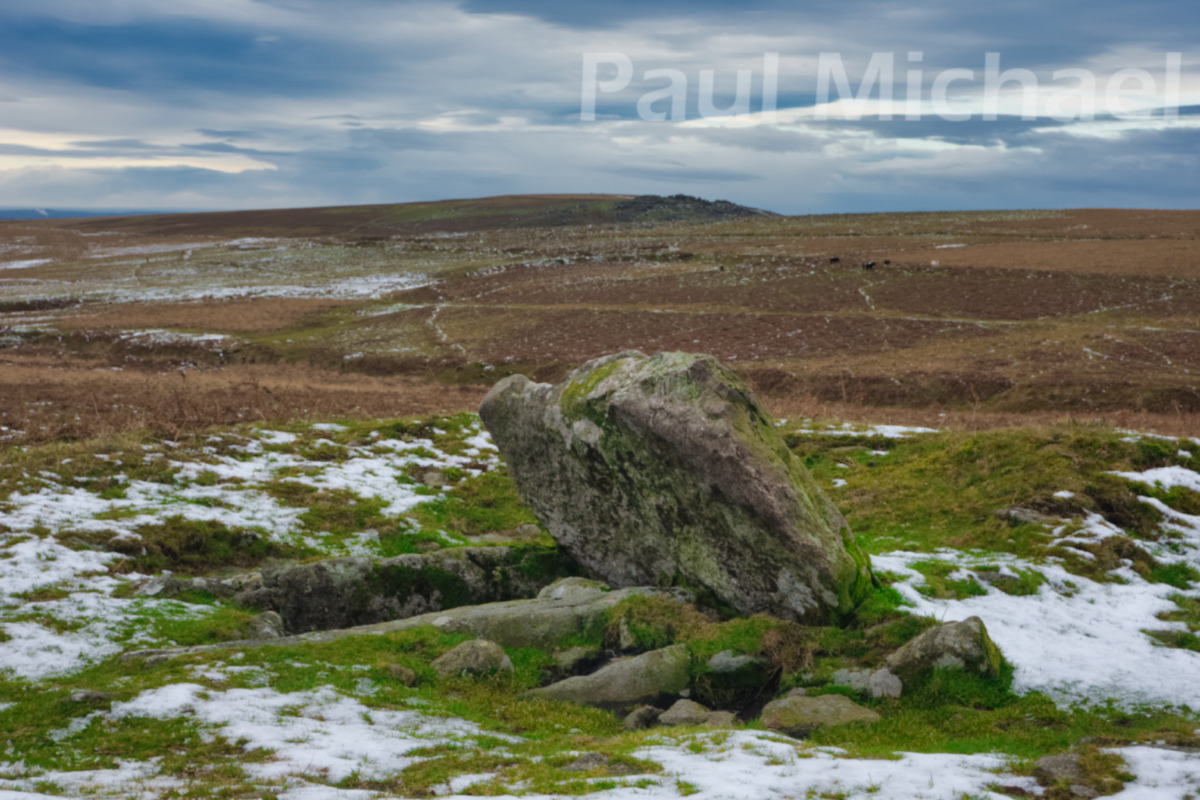
What is Wild Camping
Search the internet for definitions and details; most agree that ‘wild camping’ is camping in a tent away from campsites and out in the wilderness with no facilities. Within the area of Dartmoor known as the ‘commons’, an extensive area of the National Park, there is a right to roam, meaning a right to access and stray from set footpaths over the commons. It was always taken that there was also a right to take shelter and sleep overnight. In this context, wild camping is erecting a tent or shelter and sleeping overnight to wake up and move on in the morning. This is true for many parts of the Scottish wilderness but, sadly, Dartmoor was the only place in England and Wales where wild camping was legally allowed.
Wild camping is a relatively new phrase. It is a trendy phrase that many seasoned and older walkers had never heard of until around two decades ago, It has been even more popularised in recent years, mainly because of the COVID lockdowns and restricted foreign travel. Instead of going to Ibiza, many flocked to organised campsites and open parkland, including Dartmoor, for wilder camping to experience sleeping under the stars.
While many visitors to Dartmoor obey the rules, a few didn’t and caused a great deal of damage. Landowners will be upset by this because many of them are farmers and have livestock to worry about. Empty cans, plastics and other rubbish can be lethal to livestock and someone has to pay to clear it up. There is also the risk of fire with barbeques and open fires being used, which are against the rules set by the Dartmoor National Park Association (DNPA).
Final Judgement References to Camping
The court case’s final judgement makes specific reference to the phrase ‘camp there overnight’ in its introduction para (1) …
The principal issue in this case is whether section 10(1) of the Dartmoor Commons Act
1985 (“the 1985 Act”) confers on the public a right not only to walk or ride a horse on
the commons but also to camp there overnight
The final judgement cites section 10(1) of the 1985 Act…
(1) Subject to the provisions of this Act and compliance with all rules,
regulations or byelaws relating to the commons and for the time being in
force, the public shall have a right of access to the commons on foot and
on horseback for the purpose of open-air recreation; and a person who
enters on the commons for that purpose without breaking or damaging
any wall, fence, hedge gate or other thing, or who is on the commons for
that purpose having so entered, shall not be treated as a trespasser on the
commons or incur any other liability by reason only of so entering or
being on the commons.
Camp?
From this, we need to understand what the word ‘camp’ means. In the context of the statement above, we must take the meaning as a verb – to camp. It is not a noun, nor an adjective.
Both the Oxford and Cambridge dictionaries agree on the meaning of the verb, camp…
Most definitions refer to a tent. Some cite ‘other temporary structures’ and use examples such as refugee camps.
The problem here is that ‘camp’ infers that a person can stay or live in a tent for one or more nights and days. Walkers take shelter for one night in one place. They may erect a small tent, but could also employ a tarpaulin or some other means of providing shelter. Some walkers use a sleeping bag alone, like the homeless in our towns and cities. Whatever they use is carried with them, so it has to be very lightweight, compact and easily erected and put away to continue the walk.
Open-air Recreation
Section 10(1) of the 1985 Act specifically states the term ‘open-air recreation’. The final judgement ruled that one cannot confer a right to camp overnight on the Dartmoor commons. Yet, the judgement upholds that there is a right to walk or ride on horseback on the commons.
From this, the judgement takes the view that it cannot be considered an open-air recreation to camp overnight. The Darwall’s barrister submitted, rather subjectively, that…
…the right to roam conferred by section 10(1) of the 1985 Act included
ancillary rights such as the right to walk a dog, to sit down and have a picnic or to stop
and enjoy the view. However, camping was not such an ancillary right. He submitted that
it simply did not satisfy the test of necessary implication. No part of Dartmoor is situated
more than five miles from a public road, a walker or rider could always get to one of the
campsites and, in any event, if they wanted the pleasure of wild camping, they could
always ask the landowner for permission or take their chances and run the risk of being
moved on…
Camping is an open-air recreation. According to sources like Wikipedia and many others, but in particular, Active Outdoors to which Sport England contribute, camping is listed as outdoor or open-air recreation. It is listed as the 3rd most popular on their extensive list.
Seriously, how could anyone, let alone a judge, rule that camping is not an open-air recreation as with walking or horse riding or even taking a picnic? The view of Darwall’s barrister is preposterous to anyone who has walked Dartmoor or any other wilderness for that matter. The 1985 Act does not mention anything about ancillary rights. That was made-up nonsense.
Open-air recreation has no time limit. Young children and adults from far and wide come to Dartmoor to walk, ride, rest, take nourishment and sleep under the stars in pursuit of the challenges they wish to participate in.
Fact or Conjecture?
The introduction of the final judgement outlines that it is to determine if the 1985 Act confers the right to walk or ride on horseback on the commons and camp there overnight. The facts, as presented in the case are outlined here, but let’s determine how factual some entries really are…
Agreed Facts
Dartmoor was designated a National Park in 1951 under section 5 of the National Parks and Access to the Countryside Act 1949 (“the 1949 Act”). Dartmoor Commons (‘the Commons’) are areas of unenclosed moorland which are privately owned, but on which other locals have the right to put their livestock. The Commons comprise some 37 per cent of the National Park and 75 per cent of the moorland.
In summary of the final judgement, section 5 – the DPNA took over the Authority function of the National Park in 1989. Bylaws of the 1985 Act and the 1949 Act remain in force today. Specific to camping and in summary…
- No vehicles are to be used
- Cannot erect a tent in any area included in Schedule 2 of the bylaws – the restricted areas
- Must be more than 100 metres from a public road or enclosure
- Cannot camp for more than two consecutive nights (unless it is land designated as permissive to do so)
What AMounts to Conjecture
Mr and Mrs Darwall, are farmers, landowners and commoners. They have
become concerned about the potential harm of camping, especially ‘wild camping’ or
‘backpacking’, on the Commons near Stall Moor.
One cannot be deemed a farmer by simply buying land, property and livestock. Mr Darwall is a hedge fund manager. There is a stark difference between these professions.
Backpacking covers too wide a scope – from a day walk to a multi-day hike. There is no case for the right of the public to access the commons to backpack. It was not mentioned in the opening statement and should not have been presented during the hearing.
There is a great deal of argumentative discussion within the final judgement with cross-references to, for example, the Law of Property Act 1925 and the Countryside and Rights of Way Act 2000. These Acts were not developed with the Dartmoor National Park in mind. They are generic and apply to all of England and Wales. Whereas, the 1985 Act specifically applies to the Dartmoor commons.
There are a lot of references to other historic judgements to interpret the wording used within the 1985 Act and the context it is written. The wording and context of the 1985 Act are clear and unambiguous. These facts were already in place at the time it was developed…
- Ten Tors was established in 1959 as an annual Dartmoor event comprising much training leading up to the challenge itself. It is a two-day challenge that involves sleeping in a tent, on the commons, overnight.
- The Duke of Edinburgh Award was established in 1956. The awards required participants to undertake orienteering and survival expeditions. Dartmoor is popular because of the open wilderness and the need for participants to carefully select a location to take shelter for the night.
- Scores of people have for decades been visiting Dartmoor for their walking and orienteering challenges, as well as for their physical and mental health and well-being. While most visited just for the day, others visited over two or more days, sheltering and sleeping overnight.
- Countryfile and other media outlets published (up until now) that it was legal to wild camp on the Dartmoor Commons. Many of them recognised the bylaws and warned that there are areas where camping is prohibited. Clearly, they read the 1985 Act, took into consideration all the above points, and maybe more, and interpreted it correctly.
Views and Opinions
While the claimant’s barrister accepted that public access can mean walking out with a dog or sitting and having a picnic, he argued that camping is incompatible because the camper occupies the land. In doing so they prevent other public users from walking on that land. How ridiculous a notion is that? While a family sitting on a picnic rug and occupying the land is acceptable, he finds that a person in a tent at night time, amidst a barren landscape, is not. The fact is that anyone sitting in a designated national park or common land is occupying that bit of land, area or bench they are sitting on for as long as they are there.
Section 26 – the Darwall’s barrister asserted this…
No part of Dartmoor is situated more than five miles from a public road, a walker or rider could always get to one of the campsites and, in any event, if they wanted the pleasure of wild camping, they could always ask the landowner for permission
Again, preposterous! Most prolonged walks are arranged such that the walker(s) starts at a point where they can be dropped or their vehicle parked. They will walk from point to point or in a circular route and be picked up or get back to their vehicle. The barrister makes it sound like Dartmoor is littered with campsites that one can simply get to by walking an extra 5 miles.
There are 55 landowners listed for the Dartmoor commons. They are not publicly listed. Therefore, it is not possible for one to simply ‘ask the landowner’. This in itself is a preventive barrier to a right of access.
Section 35 – the Darwall’s barrister submitted from a previous judgement that Mr Steen MP was talking about the right to roam to Parliament. The barrister’s opinion…
What Mr Steen said was not ambiguous and did not lack clarity. No-one in Parliament can have thought that they were being asked to sanction a right to camp.
To ‘roam’ is to wander without the need to pre-plan or even to know where one is going. Nomadic tribes have roamed the wilderness since the dawn of human existence. And, yes, they build camps and they do camp.
Resting and Taking Shelter
It seems that the lawyers, landowners and walkers could continue arguing about what wild camping is or isn’t for years to come. So, are ‘wild camping’ or ‘camp overnight’ appropriate terms to use for walkers who seek shelter overnight while in pursuit of their right to access the Dartmoor commons?
Section 10(1) of the 1985 Act states that the public shall have a right of access to the commons on foot or on horseback for the purpose of open-air recreation. It does not state whether this is during daylight hours or within specific time limits. It does not rule out a right of access overnight. Neither does it restrict the time of any one visit.
Humans need nourishment, rest and sleep. Those in pursuit of their right to access the Dartmoor commons for a part of the day will need to stop to rest and take nourishment. Over two or more days, a period of sleep will be necessary. These are basic physiological human requirements that are well documented by Maslow and include food, drink, shelter, warmth and sleep. The right to roam is also a right to these basic human requirements.
Taking Shelter
When we take it from the above point of view, walkers are not camping. They are taking shelter. On relatively mild days on Dartmoor, there is often a need to hunker down and take shelter from the wind or rain to simply enjoy a hot drink and a snack. When the winter sets in there may be times when walkers will employ additional equipment to protect them from the elements. When it hails on exposed areas like Dartmoor, it can be very painful without the means to protect yourself and shelter from it.
If there is a need for sleep, walkers need to shelter, not just from the elements but also from wildlife and weather. In the summer there are midges and horseflies. In the winter it is mainly about the elements – wet and very windy and cold.
Walkers are not wild camping or camping overnight. They are taking shelter to allow a period of rest to eat and sleep. When they awake, the shelter is taken down and, other than a small area of flattened grass, there is no evidence of them being there.
A Bivouac Shelter
A shelter that provides for this short-lived activity is known as a ‘bivouac‘. Some might confuse this to mean a special type of waterproof sleeping bag, but a bivouac shelter can include all manner of equipment – natural and artificial – to provide a means of shelter. It also includes the use of tents. It is very short-lived – just one night at one location typically.
The use of the term ‘bivouac shelter’ removes a great deal of conjecture that people might associate with broad-scoped terms like camping, wild camping and backpacking. It is simply a shelter that allows a walker to rest, take nourishment and sleep before moving on. You can’t associate bivouac sheltering with ‘being on holiday’ as you could with ‘camping’.
Conclusion
The final judgement must be appealed. The ruling that camping is not an open-air recreation pursuit is simply ridiculous. Such a ruling is completely out of context with the subject matter – that of walking or riding on a horse and enjoying the rights of access to roam the Dartmoor commons provided in the 1985 Act.
It is not appropriate and should certainly not be made illegal to walk for several hours without taking rest and nourishment. The 1985 Act does not prohibit prolonged walks. Rest and sleep will be required for such pursuits. In taking rest, nourishment and sleep there will likely be a need to shelter, regardless of the time of day or night. It cannot be a right to walk or roam without the right to shelter.
All references to camp, camping, wild camping and backpacking should be ignored with respect to the interpretation of the 1985 Act. Better descriptive terms are sleep, sheltering, bivouac (as in to provide or erect), and bivouac sheltering. These terms are much less ambiguous in their meanings and narrative.
The Darwalls purchased the land 10 years ago. As with any property or asset purchase, questions are raised and resolved at the time of purchase. This land had long-standing covenants that are protected by one or more parliamentary Acts. They didn’t pursue due diligence prior to the purchase. Parliament should not afford them the right to do so now.
Latest News
6th Feb 2023 – With the help of the Dartmoor Preservation Association and public crowd-funding, the Dartmoor National Park Association is going to appeal against the Final Judgment in the Supreme Courts.
20th May 2025 – The Supreme Court backs wild camping on Dartmoor. This is the absolute final decision with no means of appeal. The court’s decision was based on the interpretation of the Dartmoor Commons Act 1985, which grants the public a right to “open-air recreation” on the commons.
At last, some ‘common’ sense has prevailed. This is the best outcome for everyone aside from Mr Darwall.
There is some concern of the moors being deluged with campers in the wake of this news. There are the usual embellished media stories of the nasty side of of people flouting the National Park rules. However, calm and normality will return over the coming years and those that use the Dartmoor commons for their business or recreation purposes will be able to do so uninterrupted by unscrupulous, greedy landowners pretending to be farmers.
Read my articles: Moorland Walks.

